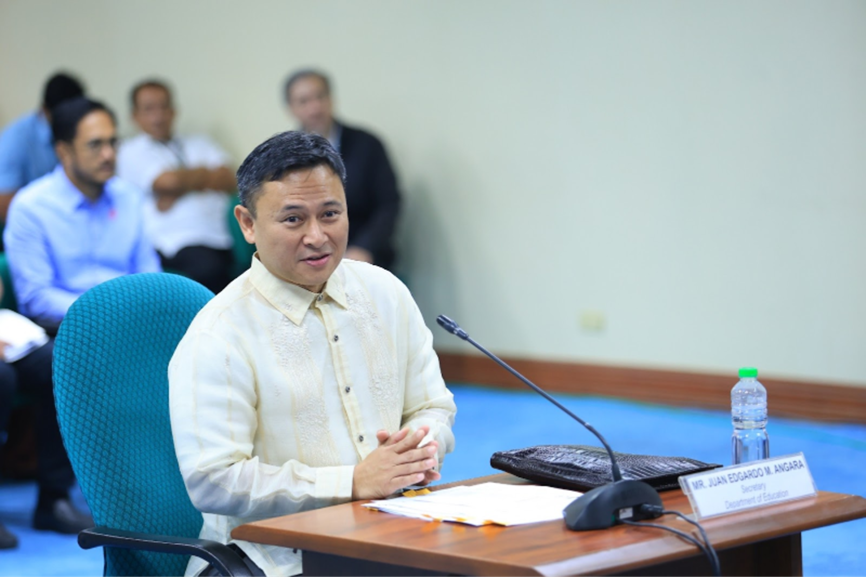DepEd eyes phased implementation of revised SHS curriculum starting SY 2025-26
Education Secretary Sonny Angara announced on January 19 that the revised senior high school curriculum will be implemented in phases starting in the 2025-2026 school year.

Revised Senior High School Curriculum to Roll Out by 2025, DepEd Announces
Education Secretary Sonny Angara announced that the Department of Education (DepEd) will begin the phased implementation of the revised senior high school (SHS) curriculum in the 2025-2026 school year. Initially slated for 2026, the timeline has been adjusted to allow for an earlier rollout while accommodating schools' readiness through a phased approach.
Under the new curriculum for Grades 11 and 12, core subjects will be significantly streamlined, reducing from the previous 15 to just 5-7 subjects. This reduction aims to ease the academic load on students and provide them with more meaningful, targeted learning experiences. “Originally, the plan was to implement it in 2026, but we are now targeting 2025. However, some schools have expressed concerns about the difficulty, so we will phase in the implementation. We are open to that,” Angara shared during the Kapihan sa Manila Bay forum.
A Flexible Curriculum for a Modern Education
The revised curriculum introduces a core framework that all schools will follow, with an emphasis on essential subjects such as communications, Filipino history, basic math and science, computing, and life skills. These subjects are designed to equip students with the foundational knowledge and competencies required for both further education and the workforce. In addition to the mandatory subjects, the curriculum gives schools—particularly private institutions—the flexibility to offer electives and additional courses based on their resources and the interests of their students.
“This approach allows students to explore subjects that truly interest them, providing a more personalized and engaging educational experience,” Angara explained. The shift toward elective-based learning reflects global trends in education, where students are encouraged to take ownership of their learning journey and prepare for diverse career paths.
Teachers Welcome Change
Educators have expressed support for the proposed adjustments, recognizing the potential benefits for both students and the education system as a whole. By reducing the number of core subjects, the new curriculum addresses long-standing concerns about students' heavy workload and ensures a more focused and in-depth learning experience. The changes are also expected to produce job-ready and responsible graduates equipped with practical skills and critical knowledge.
Teachers also stand to benefit from the revisions, as the streamlined curriculum allows for more specialized teaching and potentially reduced stress from managing an overloaded syllabus. This approach aligns with the goal of enhancing the quality of education through better teacher preparation and delivery.
Building on Prior Reforms: Lessons from the K-10 Curriculum Revision
The announcement of the new SHS curriculum follows significant changes made to the K-10 curriculum, which were introduced in August 2023. In that earlier reform, DepEd reduced learning competencies by a remarkable 70%, cutting the number from approximately 11,700 to just 3,600. This shift also trimmed down the number of subjects, with a stronger focus on foundational skills for early learners, particularly in Kinder to Grade 3. Literacy, numeracy, and socio-emotional development were prioritized to build a solid foundation for lifelong learning.
These earlier reforms demonstrated the department's commitment to creating a more efficient and effective education system, and the lessons learned from the K-10 rollout are expected to inform the implementation of the revised SHS curriculum.
Moving Forward: Bridging Challenges and Opportunities
In 2023, DepEd established a national task force to review the implementation of the SHS program in both public and private schools. The insights gathered from this review have shaped the revised curriculum and will continue to guide its implementation. However, challenges remain, particularly in ensuring the readiness of schools across the country.
Education stakeholders have raised concerns about potential difficulties in adapting to the changes, particularly for smaller schools with limited resources. To address these concerns, DepEd has committed to a phased implementation process, providing support and flexibility for schools to transition effectively. The department also recognizes the importance of continuous dialogue with educators, administrators, and parents to ensure the success of the initiative.
As the Philippine education system undergoes these transformative changes, the revised SHS curriculum represents a significant step toward aligning education with the needs of the 21st century. By prioritizing foundational skills, reducing academic burdens, and empowering students with choice, the reforms aim to create a more inclusive, adaptable, and future-ready education system.
What's Your Reaction?












/https://tf-cmsv2-smithsonianmag-media.s3.amazonaws.com/filer_public/54/66/546650fa-26a4-40fd-8d6d-5a7a04540f81/rosetta2.png)
:max_bytes(150000):strip_icc():focal(999x0:1001x2)/robert-prevost-050825-1-39395418ab494da5a3a700c9478e66c8.jpg)















































format(webp))
format(webp))

























